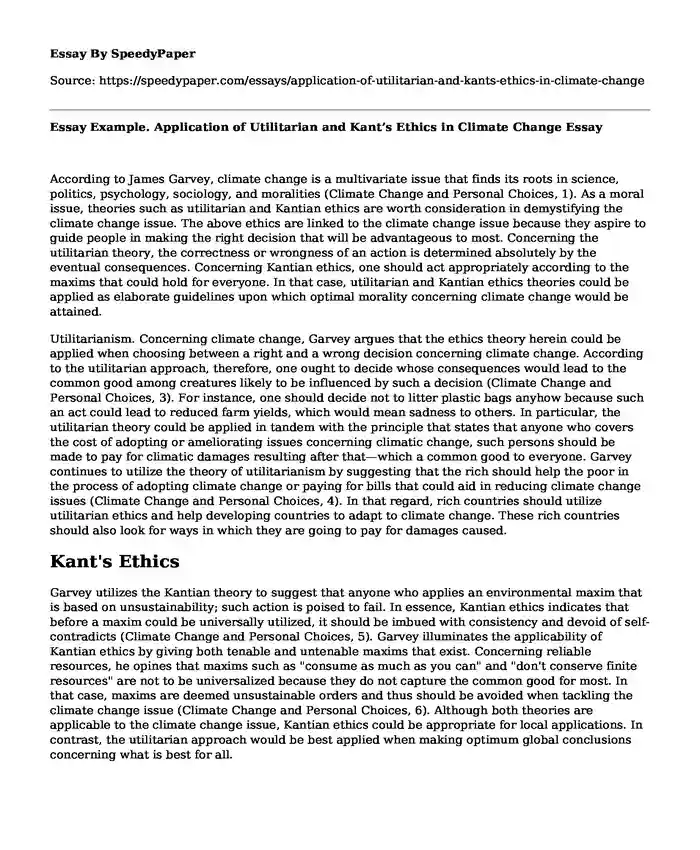
| Essay type: | Compare and contrast |
| Categories: | Ethics Immanuel Kant Climate change |
| Pages: | 3 |
| Wordcount: | 629 words |
According to James Garvey, climate change is a multivariate issue that finds its roots in science, politics, psychology, sociology, and moralities (Climate Change and Personal Choices, 1). As a moral issue, theories such as utilitarian and Kantian ethics are worth consideration in demystifying the climate change issue. The above ethics are linked to the climate change issue because they aspire to guide people in making the right decision that will be advantageous to most. Concerning the utilitarian theory, the correctness or wrongness of an action is determined absolutely by the eventual consequences. Concerning Kantian ethics, one should act appropriately according to the maxims that could hold for everyone. In that case, utilitarian and Kantian ethics theories could be applied as elaborate guidelines upon which optimal morality concerning climate change would be attained.
Utilitarianism. Concerning climate change, Garvey argues that the ethics theory herein could be applied when choosing between a right and a wrong decision concerning climate change. According to the utilitarian approach, therefore, one ought to decide whose consequences would lead to the common good among creatures likely to be influenced by such a decision (Climate Change and Personal Choices, 3). For instance, one should decide not to litter plastic bags anyhow because such an act could lead to reduced farm yields, which would mean sadness to others. In particular, the utilitarian theory could be applied in tandem with the principle that states that anyone who covers the cost of adopting or ameliorating issues concerning climatic change, such persons should be made to pay for climatic damages resulting after that—which a common good to everyone. Garvey continues to utilize the theory of utilitarianism by suggesting that the rich should help the poor in the process of adopting climate change or paying for bills that could aid in reducing climate change issues (Climate Change and Personal Choices, 4). In that regard, rich countries should utilize utilitarian ethics and help developing countries to adapt to climate change. These rich countries should also look for ways in which they are going to pay for damages caused.
Kant's Ethics
Garvey utilizes the Kantian theory to suggest that anyone who applies an environmental maxim that is based on unsustainability; such action is poised to fail. In essence, Kantian ethics indicates that before a maxim could be universally utilized, it should be imbued with consistency and devoid of self-contradicts (Climate Change and Personal Choices, 5). Garvey illuminates the applicability of Kantian ethics by giving both tenable and untenable maxims that exist. Concerning reliable resources, he opines that maxims such as "consume as much as you can" and "don't conserve finite resources" are not to be universalized because they do not capture the common good for most. In that case, maxims are deemed unsustainable orders and thus should be avoided when tackling the climate change issue (Climate Change and Personal Choices, 6). Although both theories are applicable to the climate change issue, Kantian ethics could be appropriate for local applications. In contrast, the utilitarian approach would be best applied when making optimum global conclusions concerning what is best for all.
Conclusion
Although climatic changes may find solutions on various topics such as science and politics, morality plays an integral part in it because we all have a social responsibility to climate change issues. Based on utilitarianism and Kant's ethics, one should think about the benefit of most people in society instead of thinking about an individual's happiness. Concerning utilitarian ethics, one ought to think about the consequences of their action before determining their endeavor's rightness or wrongness. Regarding Kant's ethics, an individual should question and avoid local maxims that are inconsistent and lack sustainability insofar as a climatic change is concerned.
Work Cited
Climate Change and Personal Choices. Climate change and you: consequences, intentions, and consistency, n.d.
Cite this page
Essay Example. Application of Utilitarian and Kant's Ethics in Climate Change. (2023, Nov 03). Retrieved from https://speedypaper.com/essays/application-of-utilitarian-and-kants-ethics-in-climate-change
Request Removal
If you are the original author of this essay and no longer wish to have it published on the SpeedyPaper website, please click below to request its removal:
- Acid Rain and Plant Growth - Free Essay on Air Pollution
- Free Essay on the Significance of Rainforests
- Free Essay: Analysis of an Article on Photolytic Compounds
- Free Essay: Philosophical Theories Analysis
- American Indian Mascot Essay Sample
- Paper Example: China and the Greenhouse Gases
- Forever Chemicals in New Jersey. Paper Example
Popular categories




